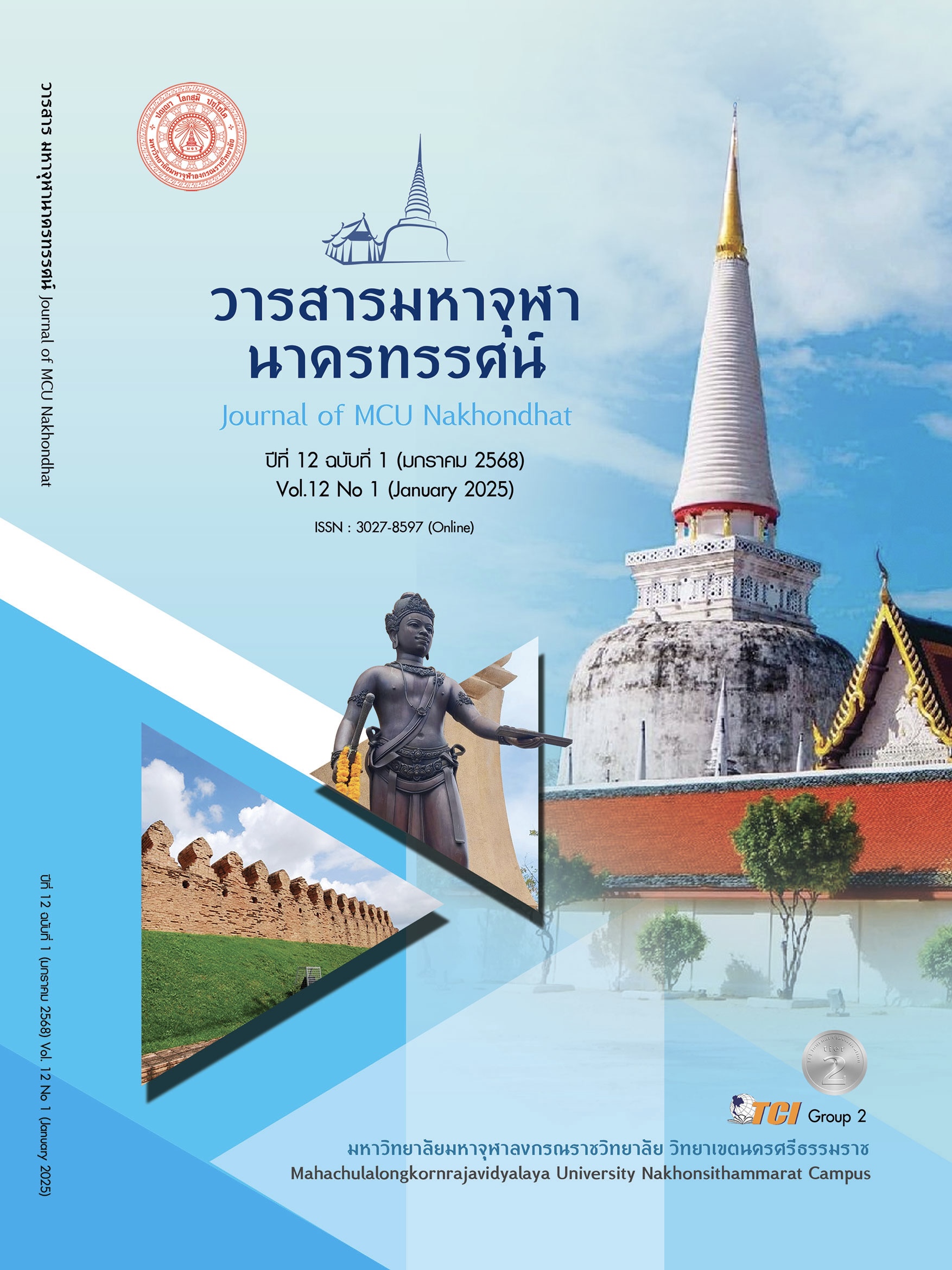DEVELOPMENT OF INTELLECTUAL CAPITAL AND THE LOCAL ADMINISTRATOR ROLES OF SUBDISTRICT MUNICIPALITIES AFFECTING THE LIFE QUALITY OF PEOPLE IN CHONBURI PROVINCE
Main Article Content
Abstract
The objectives of this research were to 1) Study the quality of life of people in Chonburi Province, 2) Analyze intellectual capital development and the roles of local municipal administrators impacting the quality of life in Chonburi Province, and 3) Propose guidelines for developing intellectual capital, enhancing the potential of local administrators, and improving the quality of life of people in Chonburi. The study utilized a mixed-method approach. The population included residents aged 18 and older who were eligible voters and had permanent residency within the municipal area of Chonburi. The quantitative sample consisted of 400 individuals, with a questionnaire used as the research tool, while the qualitative sample included 20 individuals, using in-depth interviews as the research instrument. Data analysis involved statistical methods such as frequency, percentage, mean, standard deviation, and multiple regression analysis. The findings showed that 1) The overall quality of life development for residents in Chonburi Province was high, with mean scores ordered from highest to lowest in the areas of mental well-being, physical health, social relationships, and environment, respectively, 2) The intellectual capital development and the roles of municipal administrators, including strategic direction-setting, human capital, structural capital, ethical practice, and decision-making, significantly impacted the quality of life of Chonburi residents, with a significance level of .05, and 3) The study recommended that local administrators enhance their strategic direction-setting approach to improve the quality of life for residents in Chonburi's municipal areas, leading to development aligned with current situations for better quality of life in the future.
Article Details

This work is licensed under a Creative Commons Attribution-NonCommercial-NoDerivatives 4.0 International License.
References
กรมการปกครอง กระทรวงมหาดไทย. (2565). สถิติประชากรทางการทะเบียนราษฎร (รายเดือน). เรียกใช้เมื่อ 26 กันยายน 2566 จาก https://stat.bora.dopa.go.th/stat/statnew/statMONTH/statmonth/#/mainpage
จรัสศรี จบไพร และคณะ. (2566). แนวทางการพัฒนาคุณภาพชีวิตที่ตอบสนองความต้องการของประชาชนในพื้นที่รอบโรงไฟฟ้า อำเภอท่าม่วง จังหวัดกาญจนบุรี. วารสารสหวิทยาการมนุษยศาสตร์และสังคมศาสตร์, 6(4), 2090-2103.
นเรนทร์ฤทธิ์ ไตรภูมิพิทักษ์. (2564). บทบาทผู้นำท้องถิ่นของภาคตะวันออกเฉียงเหนือในยุคการเปลี่ยนแปลง. วารสารการบริหารการศึกษา มมร.วิทยาเขตร้อยเอ็ด, 1(2), 41-48.
พิชญ์ณิฐา พรรณศิลป์ และคณะ. (2558). บทบาทของผู้บริหารท้องถิ่นในศตวรรษที่21. วารสารสันติศึกษาปริทรรศน์ มจร, 3(2), 146-161.
วีรวุฒิ จุมพลคุณวุฒิ. (2567). การพัฒนานโยบายสาธารณะเพื่อสุขภาพและการมีส่วนร่วมของประชาชน ที่ส่งผลต่อคุณภาพชีวิตของประชาชนในจังหวัดเพชรบูรณ์. วารสารมหาจุฬานาครทรรศน์, 11(7), 270-281.
อภิชา พรเจริญกิจกุล. (2564). คุณภาพชีวิตของประชาชนผู้ถือบัตรสวัสดิการแห่งรัฐ กรณีศึกษา อำเภอดอนตูม จังหวัดนครปฐม. วารสาร มจร พุทธปัญญาปริทรรศน์, 6(2), 120-131.
อาทิตย์ พุทธิศักดิ์แสง และคณะ. (2566). การบริหารและการพัฒนาที่ยั่งยืนที่ส่งผลต่อคุณภาพชีวิตของประชาชนในจังหวัดนครราชสีมา. วารสารวิทยาลัยนครราชสีมา สาขามนุษยศาสตร์และสังคมศาสตร์, 17(1), 316-331.
Best J. W. (1981). Research in Education. (4th ed.). New Delhi: Prentice Hall of India Pvt. Ltd.
Cronbach, L. J. (1990). Essentials of Psychological Test. (5th ed.). New York: Harper Collins.
Huu, Y. H. & Fang, W. (2008). Intellectual Capital and New Product Development Performance: The Mediating Role of Organizational Learning Capability. Technological Forecasting and Social Change, 76(5), 664-677.
Marcela, C. et al. (2016). Informal Employment and Quality of Life in Rural Areas of Ukraine. European Countryside, 8(2), 135-146.
Nonaka, I. (1991). The Knowledge Creating Company. Harvard Business Review, 69(6), 96-104.
Pablos, P. O. (2004). Measuring and Reporting Structural Capital: Lesson from European Learning Film. Journal of Intellectual Capital, 5(4), 629-647.
Stewart, T. (1997). Intellectual Capital the new wealth of organization. London: Nicholas Berkley.
UNESCO. (1993). Quality of life Improvement. Bangkok: UNESCO Regional Office.
Yamane, T. (1973). Statistics: An Introductory Analysis. (3rd ed.). New York: Harper and Row Publications.


